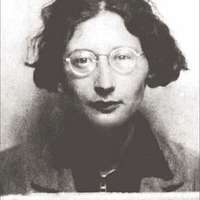Robert Zaretsky at The American Scholar:
 Though Weil coined the term decreation, she never treated it at length in a single text. Instead, she seeds passages on the subject through her later notebooks, not living long enough to give them shape. (Depending on your perspective, Thibon helpfully or misleadingly grouped several of these passages under the rubric of “Décréation” in Gravity and Grace.) But honestly, how much more she could have said about this claim? There are only so many ways to express the thought that I should unmake the being who is expressing that same thought. I have read and written a good deal on Weil’s work and life, but the passages on decreation still shock me. They are steeped in Christian imagery and ideals, and I sometimes wonder if my reaction to them has to do with the fact that I am neither a Christian nor religious. (Besides, I know Christians who, like me, are just as stunned by these fragments.) And my shock is not, I believe, because I do not accept a transcendental reality. Instead, I am shocked because her notion of decreation questions not just how I have lived my life but why I should have ever bothered to live in the first place—other than, that is, to surrender my life as quickly and gladly as possible. “Our existence,” she observes matter-of-factly, “is made up only of his waiting for our acceptance of not being.”
Though Weil coined the term decreation, she never treated it at length in a single text. Instead, she seeds passages on the subject through her later notebooks, not living long enough to give them shape. (Depending on your perspective, Thibon helpfully or misleadingly grouped several of these passages under the rubric of “Décréation” in Gravity and Grace.) But honestly, how much more she could have said about this claim? There are only so many ways to express the thought that I should unmake the being who is expressing that same thought. I have read and written a good deal on Weil’s work and life, but the passages on decreation still shock me. They are steeped in Christian imagery and ideals, and I sometimes wonder if my reaction to them has to do with the fact that I am neither a Christian nor religious. (Besides, I know Christians who, like me, are just as stunned by these fragments.) And my shock is not, I believe, because I do not accept a transcendental reality. Instead, I am shocked because her notion of decreation questions not just how I have lived my life but why I should have ever bothered to live in the first place—other than, that is, to surrender my life as quickly and gladly as possible. “Our existence,” she observes matter-of-factly, “is made up only of his waiting for our acceptance of not being.”
more here.
